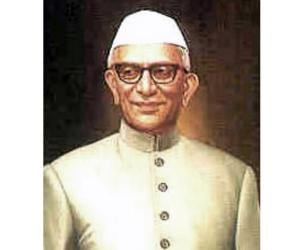Published on: December 6, 2021
MORARJI DESAI
MORARJI DESAI
NEWS
A copy of the Bhagavad Gita, a Parker pen, a Gandhi topi (cap) and a tulsi mala are some of the personal effects of former Prime Minister Morarji Desai that will make their way to the Museum of Prime Ministers, New Delhi
ABOUT MORARJI DESAI
- Born on 29 February 1896 in the village of Bhadeli Gujarat.

- Graduated from Wilson Civil Service, Bombay in 1918
- Served as deputy collector for 12 years.
Freedom struggle
- In Civil Disobedience Movement – resigned from government service
- In 1931 – became a member of the All India Congress Committee
- Arrested during CDM & Quit India Movement .
Political life
- 1952 – Chief Minister of Bombay .
- 1956 – Became Union Cabinet as Minister of Commerce and
- 1958 – given the charge of Finance Department
- Resigned from the Union Cabinet in the year 1963 under the Kamaraj Plan ( Proposed that all the senior leaders of the Congress should resign from their posts and devote all their energies to the revival of the Congress)
- Lal Bahadur Shastri persuaded him to become the chairman of the Administrative Reforms Commission set up to restructure the administrative system.
- Arrested on 26 June 1975 during the declaration of emergency
- Started an indefinite hunger strike to support the Navnirman movement of Gujarat (socio-political movement against the economic crisis and corruption in public life which was started in the year 1974 by the students and middle class people of Gujarat)
- Unanimously elected as the leader of the Janata Party in Parliament and on March 24, 1977, he was sworn in as the Prime Minister of India.
IDEOLOGY
Against inequality
- Believed that unless poor people living in villages and towns are able to live normal lives, socialism has no meaning.
- Took concrete steps to implement this thinking by enacting progressive laws towards resolving the difficulties of farmers and tenants.
Supporting austerity
- Implemented his thinking in matters related to economic planning and financial administration
- Increased revenue, reduced wastage and promoted austerity in government expenditure on administration
- Kept the fiscal deficit at a very low level by applying financial discipline. He tried to control the wasteful expenditure by the upper classes of the society by controlling it.

